|
|
|
Sort Order |
|
|
|
Items / Page
|
|
|
|
|
|
|
| Srl | Item |
| 1 |
ID:
120304
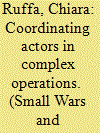

|
|
|
|
|
| Publication |
2013.
|
| Summary/Abstract |
International responses to conflicts and humanitarian emergencies have become more crowded. Not only do traditional actors intervene on a greater scale, such as non-governmental organizations and the military, but new actors such as Private Military Security Companies also play an increasingly important role. These actors often differ in their precise objective and the constituencies they are accountable to. Yet, the practices of these actors in operations are intertwined and many of their tasks overlap. Improved communication and coordination of these actors in complex operations can thus be expected to lead to strong increases in mission effectiveness. This Special Issue provides a conceptual platform to understand and explain under what conditions coordination among these actors occurs. The articles cluster around three themes. A first set focuses on who the actors involved are along a private vs public and military vs civilian divide; a second group of articles assesses experiences of coordination of different actors in the field; finally, a third looks at a plurality of elements that may trigger or hinder coordination.
|
|
|
|
|
|
|
|
|
|
|
|
|
|
|
|
| 2 |
ID:
167458
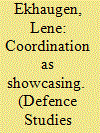

|
|
|
|
|
| Summary/Abstract |
In complex operations such as the interventions in Iraq and Afghanistan, where multiple government ministries are involved in putting together a state’s contributions, the use of national-level coordination bodies has become more widespread. Research has taken for granted that the rationale behind these bodies reflects their declared aim – enhanced coordination as a means to improve mission effectiveness. However, they appear to have had modest effect on coordination. That notwithstanding, they seem to remain popular. This prompts us to ask why such bodies are actually established. This article – based on in-depth interviews and archival records – critically explores the establishment of Norway’s ad hoc, inter-ministerial, political-level Afghanistan Forum. Distinguishing between a structural-instrumental, a cultural-institutional and an environmental perspective from organizational theory to structure the analysis, this article shows that the declared purpose of the forum, inter-ministerial coordination, proved less important than showcasing coordination efforts and keeping the coalition together. In addition, national traditions in handling coordination challenges in the central government apparatus and powerful international reforms helped bring the forum about. This has implications for research on the rationale and effectiveness of these bodies, and also for understanding their policy relevance.
|
|
|
|
|
|
|
|
|
|
|
|
|
|
|
|
| 3 |
ID:
120311
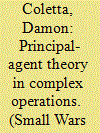

|
|
|
|
|
| Publication |
2013.
|
| Summary/Abstract |
Originally developed for identifying costs of coordination between labor and management in economics, principal-agent theory challenged traditional explanations for friction in political relations, especially in a democracy, between elected officials and the permanent bureaucracy. Not without controversy, the approach recasts democratic civil-military relations, featuring as agent a unique, military 'bureaucrat' refining goals of the state, a role normally assigned to the principal. At the same time, principal-agent applications reached international institutions as a collective actor in their own right. Drawing from civil-military relations and international institutions, this article poses still greater expansion for principal-agent dynamics. Principal-agent theory offers significant promise in complex international operations mixing inter-state, state, sub-state, and nongovernmental organizations because it clearly delineates culturally bounded normative arguments from resource-based logics; it also suggests moves such as building flexible membership institutions ahead of time to improve cooperation among international actors during the next crisis.
|
|
|
|
|
|
|
|
|
|
|
|
|
|
|
|
| 4 |
ID:
120312
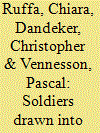

|
|
|
|
|
| Publication |
2013.
|
| Summary/Abstract |
The tactical level has become increasingly important in the conduct of contemporary complex military operations. Yet, the potential impact that this tactical level may have on domestic civil-military relations has been neglected. In this article, we focus on mechanisms by which low-level soldiers have acquired an increasing importance in tactical operations and we suggest that this may influence civil-military relations in the future. We argue that two phenomena deserve particular attention. These mechanisms are not new but they have had new effects by making it possible for soldiers to influence politics in sometimes unforeseen ways: the first is the strategic corporal and the second is the expansion of ancillary tasks. Our contribution lies at the interface between military sociology and security studies and seeks to show how the tactical level of warfare has become a fundamental context in which civil-military relations are enacted. Exploring these dynamics is fundamental to understanding under what conditions soldiers may interact with other actors in complex operations.
|
|
|
|
|
|
|
|
|
|
|
|
|
|
|
|
| 5 |
ID:
186899
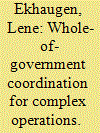

|
|
|
|
|
| Summary/Abstract |
Whole-of-government coordination has produced meagre results if measured against declared aims. However, an assessment of such coordination efforts should include also unstated aims. Based on an in-depth study of the primary high-level coordination body for Norway’s Afghanistan engagement, this article finds that the body was successful in pursuing symbolic politics. Showcasing was an underlying but non-declared aim of the body in question. These findings are significant because they provide an explanation why governments continue to pursue this kind of coordination efforts despite their apparent lack of success. Improved coordination was achieved mostly in terms of information sharing.
|
|
|
|
|
|
|
|
|
|
|
|
|
|
|
|
|
|
|
|
|